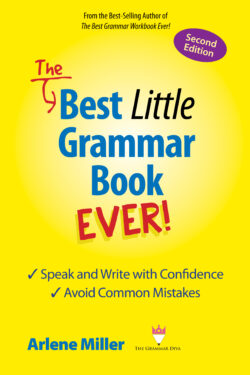 Pronouns have to be one of the most, if not the most, incorrectly used parts of speech. Their purpose is to take the place of nouns. First of all, there are six different types of pronouns, all with their own special problems.
Pronouns have to be one of the most, if not the most, incorrectly used parts of speech. Their purpose is to take the place of nouns. First of all, there are six different types of pronouns, all with their own special problems.
1. Personal pronouns are the common ones we think of first: I, we, she, he, us, they, etc. “Me and him” and other such utterances used as subjects has become so common, it seems to indicate that the speaker just doesn’t care. On the other hand, “He saw you and I” seems to be an example of someone who cares too much and knows too little. Sometimes me is actually correct! People also have a problem with the possessives of personal pronouns, usually with it’s and its. Its is the correct possessive. Even though nouns use apostrophes in their possessives, pronouns do not: ours, yours, theirs, hers, his, its. And the I/me issue is that I, we, he, she, and they are used as subjects; me, us, him, her, and them are objects. So when you answer the phone, you say, “It is I,” because the subject pronouns are also used after is.
2. Demonstrative pronouns are this, that, those, and these, used to point out. Just make sure in your writing that the noun or other pronoun these refer to is obvious. Sometimes they are actually demonstrative adjectives: “These are mine” (pronoun). “These shoes are mine (adjective).” Mistakes: Don’t say. “I like these type of shoes.” These is plural and type is singular. It is this type. Also, eliminate these ones from your vocabulary. These is enough.
3. Interrogative pronouns ask a question: who, what, whom, whose, which. The problem here is apparent: the distinction between who and whom. It is just like the personal pronouns. Who is a subject and whom is an object.
4. Relative pronouns begin clauses. They are which, who, whoses, whom, and that. “I want the smaller sandwich, which has no tomatoes.” “I want the sandwich that has no tomatoes.” Use which when the clause is not necessary for the meaning of the sentence. And use a comma. Use that when the clause is needed. And use no comma. Use who and whom when the sentence is about people: “My friend, who lives in the next town, is coming to visit.” “My friend, with whom I play baseball, is coming to visit.” Once again, no comma if the clause is necessary to the sentence: “My only friend who doesn’t live in this town is coming to visit.” (That last example assumes they have more than one friend.)
5. Indefinite pronouns are that grab bag of all, other, either, someone, everything, anyone. anything, none, one, etc. The issue here is usually whether the pronoun is singular or plural. Everyone sounds plural, but it isn’t. “Everyone is coming,” uses a singular verb because all the pronouns like that are singular. We might run into needing the singular they here: “Everyone is reading their book.” No more he or she or he/she.
6. Intensive and reflexive pronouns are the ones that end in -self. Correct use: ” I am going by myself.” “You yourself told me that.” Please don’t use a -self pronoun (most often myself) when you should be using I or me. “Tom and myself are on the committee.” (Tom and I). “She gave all the cookies to my friend and myself.” (my friend and me).
And don’t switch pronouns for no reason: “One should never adopt a cat unless you can take good care of it.”
Well, there is is. Happy pronouning! (Oh, I know it isn’t a word.)



The one and only time that my children told me of an open school night at their high school, I was dismayed and shocked when an English teacher said, “We teach literature. We only teach grammar when we need to punish the kids.”
Would anyone say, “Those cookies are for I.”? Oops, maybe that will come next — from a student whose teacher reserved grammar for punishment times.
We had an English teacher who didn’t know the difference between I and me. Obviously, that teacher didn’t teach grammar or even know grammar. They should have said, “We teach grammar only when we need to punish the kids.”
Yes. Correct us of only is one of my husband’s pet peeves. BTW, my children never again told me when they had an open school night. I wonder why.
😉 😉
These drive me crazy!:
Me and him went to…..
They went to the game with he and I.
It’s and Its incorrect usage is partly the fault of Autocorrect. It seems to favor It’s.
Is any grammar being taught in school nowadays???
Thanks for the comment!!! When I taught school, I taught a bunch of grammar — but I left ten years ago. I think part of the problem is that people teach it in the context of literature rather than its own topic. Also, many teachers are not so great at grammar!